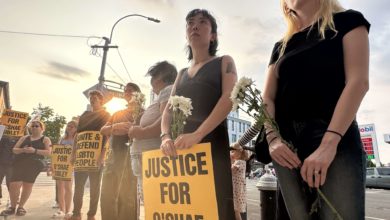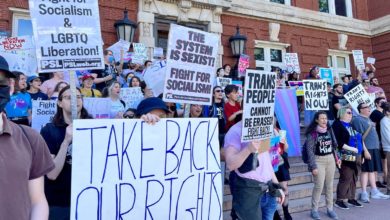Fired from below by a militant movement of lesbian, gay, bisexual and transgender people and their allies, the movement for equality has struck another blow against bigotry and discrimination. On Oct. 18, the Second Circuit Court of Appeals in New York ruled that the so-called “Defense of Marriage Act” (DOMA) is unconstitutional. Citing “a history of discrimination,” the court ruled that defining marriage as a union between a man and a woman was in fact discriminatory. The law, passed under the Clinton administration in 1996, institutionalizes discrimination against same-sex couples. This ruling has major implications for the struggle and anticipated upcoming Supreme Court hearings on the issue of marriage equality. It is the second such ruling this year. In May, the First Circuit Court of Appeals in Boston also ruled that DOMA is unconstitutional.
The ruling came in a case brought by Edith Windsor. She sued the government in November 2010 because she was told to pay $363,053 in federal estate tax after her partner of 44 years, Thea Spyer, died in 2009. They had married in Canada in 2007.
“This law violated the fundamental American principle of fairness that we all cherish,” Windsor said in a statement. “I know Thea would have been so proud to see how far we have come in our fight to be treated with dignity.”
The recent ruling puts the legal framework against discrimination on a higher and more precise level. It ups the ante in the fight for LGBT equality and will fuel more resistance to the right-wing. The May ruling was also progressive. It stated that DOMA discriminated against LGBT people, using criteria known as “rational basis review” which basically states that anti-LGBT bigotry and prejudice against LGBT people does not justify discrimination and the denial of civil rights. This rationale has been applied by the courts to many anti-gay measures around the country, including the validation of Proposition 8 in California.
The new ruling, however, goes much further and is highly significant as the struggle continues in the courts and in the streets. In this case, the higher court has applied much stricter “intermediate” and “strict” review which makes DOMA, as well as anti-LGBT discriminatory measures in many states, much harder to defend. The new ruling looks at several factors to determine discriminatory policies, such as the fact that LGBT people have been historically subjected to discrimination; that LGBT people are prevented from performing and contributing to society; that LGBT people constitute a minority that is denied access to opportunity; and that LGBT people stand out as a discrete and unique group.
These higher criteria have been applied in major rulings regarding women’s equality, as well as in cases of racial discrimination against Black, Latino and other oppressed nationalities.
In his ruling, Judge Dennis Jacobs, who was appointed to the court by President George Bush in 1992, states that “It is easy to conclude that homosexuals have suffered a history of discrimination.” He further notes that for many years in many states, homosexual conduct was criminal, and that more than a thousand federal laws are affected by DOMA. The legal basis for the ruling includes the court’s determination that “homosexuals are not in a position to adequately protect themselves from the discriminatory wishes of the majoritarian public.”
Proposition 8, the outlandishly bigoted measure banning same-sex marriage, was narrowly approved by voters in California in 2008 after rightwing forces spent millions to support it. In response, the movement surged into the streets all over the United States. The resistance and militancy of this movement, like the spirit of the Stonewall rebellion of 1969 where LGBT people stood their ground and fought back against police abuse in New York City, the uprising against Proposition 8 was, in spirit, like Part II of the Stonewall Rebellion and involved hundreds of thousands of people. Since that time, polls show a dramatic increase in support for same-sex marriage throughout society to the point where a clear majority now supports marriage equality.
Resistance and action have pushed the struggle forward as reflected in current progressive rulings by the courts. If the U.S. Supreme Court decides to turn its back and rules against equality and justice for LGBT people, the response will likely be even greater than before, echoing the heroic legacy of militant struggle by the LGBT movement and its supporters.





